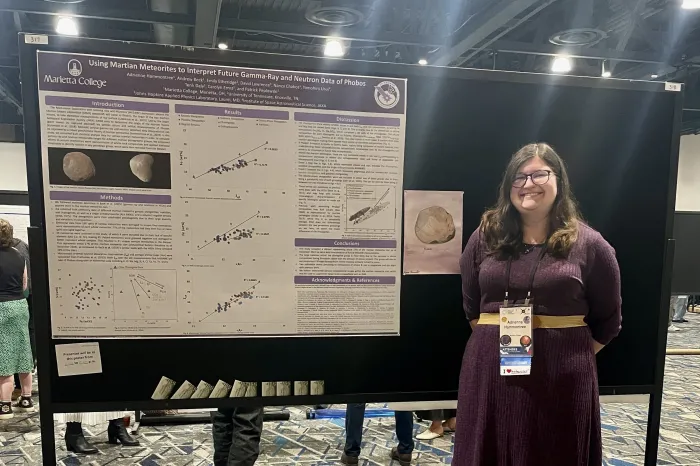
Curiosity has always pulled Adrienne Hammontree ‘26 toward the unknown, and at Marietta College, that curiosity has transformed into meaningful discovery and opportunity. This past spring, the Geology and Planetary Science double major earned national recognition for her research on Martian meteorites. Her achievement demonstrates the impact Pioneers make when they explore new ideas and expand the boundaries of knowledge.
In March, Hammontree was recognized with the Dwornik Award at the Lunar and Planetary Institute’s 2025 Lunar and Planetary Science Conference (LPSC) for her undergraduate poster, “Using Martian Meteorites to Interpret Future Gamma-Ray and Neutron Data of Phobos.” The Dwornik Award is a nationally competitive honor that celebrates outstanding student research in planetary geoscience. This LPSC award is managed and judged by the Planetary Geology Division of the Geological Society of America.
For Hammontree, the recognition offered more than academic achievement; it affirmed a future she’s been building with confidence. She knew from a very young age that she always wanted to have a career related to geology, inspired by rocks, minerals and what they reveal about our world.
“I’ve always had a love for rocks and minerals, and learning about geology comes so naturally to me,” Hammontree said. “When I was first looking to attend Marietta College in 2022, I was searching for a secondary concentration that would pair well with geology. It was that year that the Planetary Science Program was introduced, and it caught my eye.”
Prior to discussing the major with her advisor, Dr. Andrew Beck, associate professor of geology and chair of the Earth, Environmental and Planetary Sciences Department, it hadn’t occurred to Hammontree that there are other rocky bodies in space, and that geology stretches far beyond Earth. Once she learned that geology could be done on other planets, asteroids and moons, her interests grew. She began taking more planetary-focused courses, attending conferences, and participating in discussions and presentations on topics in planetary geology.
Hammontree’s award-winning research began through Marietta College’s Investigative Studies Summer Research Fellowship in 2024, when she partnered with Dr. Beck. Their work built on earlier data collection completed by Planetary Science alumna Emily Etheridge ‘22, who initiated the project in 2021. Together, their efforts compiled Martian meteorite bulk chemistries to support JAXA’s MMX mission, launching in 2026 to study the Martian moons, Phobos and Deimos.
“Working on this project is really what sparked my interest in meteorites: wanting to learn all about them and what role they play in learning about our solar system,” she said. Her research is now primarily focused on meteorites.
The work aims to support future research interpreting gamma-ray and neutron spectroscopy data from Mars and its moons. Hammontree’s findings could deepen scientific understanding of Mars’ history and the formation of Phobos and Deimos, advancing efforts to answer some of planetary science’s most essential questions. Students like Hammontree help move this research forward.
Presenting at LPSC, one of the field’s premier planetary research conferences, was both invigorating and humbling for the young professional. She had presented posters before at Marietta College, as well as at regional and national conferences, but the focus and intensity of LPSC brought a new level of pressure.
“Honestly, it was a little intimidating,” she admitted. “Luckily, everyone that I met and talked to was incredibly kind and welcoming.”
That sense of belonging grew over time. From classroom discussions to conference poster sessions, Hammontree has learned to ask questions, take risks and trust her voice – traits that transform students into scientists. In addition to presenting her research at LPSC, she presented her findings at Marietta’s 2025 All Scholars Day in April, further refining her presentation skills and confidence in communicating complex scientific ideas.
At Marietta, Hammontree serves as president of the College’s Iota Alpha chapter of Sigma Gamma Epsilon, the national geoscience honor society. She also tutors peers in geology and astronomy. She encourages prospective space science students and her peers to engage directly with the field by asking questions, connecting with professionals, participating in research, and attending conferences. These experiences give a firsthand look at the world of geology and planetary science.
“Talking to people who actively do the planetary science research that I’m interested in has taught me so much,” she said. “Attending conferences and seeing this work up close has been a huge motivation to continue pursuing my interests.”
The Dwornik Award, established in 1991 with a generous endowment by NASA scientist Stephen E. Dwornik, encourages U.S. students to become involved with NASA and pursue careers in planetary science. Each year, undergraduate and graduate students submit original research to be judged at LPSC, where outstanding poster and oral presentations are considered to receive recognition, a plaque and a monetary award. Past recipients have gone on to become leading researchers in the field.
Hammontree joins that legacy, building on Marietta’s history of innovation. She attributes her success to a community that supports her ideas, fosters her growth and champions her pursuit of meaningful work.
Next, she hopes to return to LPSC in 2026 to present findings from her senior Capstone Project. Beyond that, Hammontree plans to continue her education in geology and planetary science through her pursuit of graduate school.
At Marietta College, students learn through experiences that position them to lead in the lab, at the podium, and across the world – opening pathways for Pioneers to make meaningful impacts. Adrienne Hammontree’s achievement reflects the power of curiosity and opportunity, as well as the legacy she’s building with purpose and persistence.